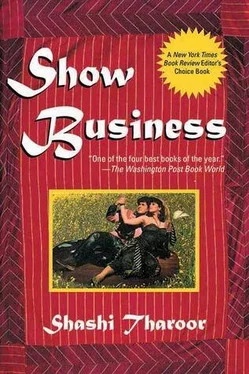The only traditional home comfort I have brought with me is Subramanyam. He is disconsolately ensconced in a temporary office and clearly prefers dealing with producers to dialing politicians, a task at which he is conspicuously less successful. But having him around to take care of the big little things in life is the one positive element in my current existence. Well, not always positive. The biggest little thing he has to contend with these days is the flood of social invitations that have deluged me since my arrival in Delhi, and he hasn’t quite mastered the knack of wading through them.
Every time I leave Parliament feeling like the hero’s friend who doesn’t get the girl, I am consoled by the Delhi party circuit. This is a vast industry, probably the single largest contributor to the capital’s GDP and certainly to my now expanding waistline. I am invited to diplomatic receptions and ministerial inaugurations, spiritless launches of spiritual books, endless seminars on such appropriate topics as India’s Timeless Traditions, teetotal cocktails hosted by alcoholic party men, dinners to celebrate everything from a wedding to a new government contract. At these events I rub shoulders (and occasionally other anatomical parts) with journalists, party workers, bureaucrats, more journalists, middlemen, wives of middlemen, editors, itinerant intellectuals, foreign correspondents, diplomats, students, chronic partygoers, chronic party givers, yet more journalists. Subramanyam’s complete ignorance of the social pecking order outside Bollywood means that I attend far too many functions, none of them of the slightest political value to me. I am fed, lionized, photographed with, and generally (as the French ambassadress innocently trilled) “very solicited.” Some of the solicitations are more welcome than others. Few are turned down.
“Subramanyam,” I explode one morning, “I can’t believe you sent me to a reception to celebrate the National Day of Outer Mongolia.”
“But wery important I am thinking,” he replies defensively. “Diplomatic and all.”
“There were about two thousand people there, almost entirely gate-crashers from the university looking for free drinks,” I tell him feelingly. “The ambassador hadn’t the slightest idea who I was. I was pinned to a corner by a Chinese woman interpreter in glasses who kept telling me how much cleaner Beijing was than Ulan Bator. The gate-crashers all recognized me, though, and kept pestering me for autographs. I was so busy signing napkins that I couldn’t even take a sip from my drink. At the end of the evening the interpreter said it was most interesting that Indian students couldn’t drink alcohol at a foreign embassy without a signed permit from a member of Parliament. She was going to report it as a rule they would do well to apply back home in China.”
Subramanyam looks suitably’ chagrined, though I think he has rather missed the point. I resume my attack, brandishing a slip of paper. “And what was this?”
He looks at the note he had neatly written out for me, on the basis of a telephone message. “Evening with Mrs. Sippy group, sir,” he enunciates, as if I can’t read.
“I know what it says, you idiot, but what did you think it meant?”
“Mrs. Sippy, sir, you are knowing Mrs. Sippy, wife of wee-eye-pee producer in Bombay. Many big movies, sir. I thought you be happy, sir, to be accepting Mrs. Sippy invitation. Wery correct it was done, sir. Secretary called and all, said no time to be sending card. Real style, sir, no?”
I take a deep breath. “Subramanyam,” I explain with more patience than I possess. “It turned out to be Mississippi. A group from Mississippi. American visitors, Subramanyam. They wanted to know about Indian culture and customs. They spoke very slowly and clearly and loudly because they knew they were talking to a foreigner. They asked about sacred cows and whether I was from the acting caste. They wondered if Indian women were branded on their foreheads at birth. How can I ever forgive you, Subramanyam?”
“I am sorry, sir,” he says miserably. “I am not understanding all this new-new names. You better be getting someone better, sir.”
“Don’t be silly, Subramanyam,” I respond in some alarm. What would I do without him? “You’ll learn. These social engagements don’t matter very much anyway. I have more than enough of them to attend. My real problem is during working hours. I’ve really got nothing to do.”
A wary gleam lights up in Subramanyam’s beady eyes. Intimate awareness of my political unimportance has helped make him chronically homesick and, sometimes, presumptuously familiar.
“Why not you going back to films, sir?” he asks. “Though Mechanic not doing wery well, many producers are wanting, sir.”
“I’m afraid they’ll just have to want some more, Subramanyam,” I advise him. “I’ve only been an MP a few months, after all. It’s hardly time to give up.”
“Oh no, sir, you are misunderstanding,” Subramanyam assures me. “I am not saying you should be giving up political life, no sir. But you can be doing both films and politics, sir, like MGR he was doing.”
I wish everyone wouldn’t keep throwing MGR at me. Ashwin, Cyrus, now even Subramanyam. The fellow went on to become a Chief Minister, of course, which has rather stolen my thunder. I’m just a backbench MP, the political equivalent of the fat-arsed females with tree-trunk thighs who dance behind the heroine.
“I don’t know how the PM would react to that, Subramanyam. Let me see. I’ll think about it.”
Ashwin, who lives where he always has, with our parents, is categorical. “The party wouldn’t like it at all, Ashok,” he says firmly. “It wouldn’t fit well with the new image they want you to build, and it would give Sugriva Sharma and his ilk a chance to say I told you so. Remember how the good Pandit used to declare during the campaign that you’d be too busy chasing actresses for the cameras to do anything for the common people of the constituency? Our people’s line always was that you’d achieved all you wanted to in Hindi films and that you now wanted to turn your energies to serving the district. When you announced after the election that you would wind up the film projects that were in hand and cancel the ones on which shooting hadn’t yet begun, it got very favorable play. You can’t go back on that now.”
“But I’m not doing very much here, Ash,” I say. “And I–I’m bored.”
He gives me a look of withering contempt, like a makeup man asked to powder the arms of a too-dark actress. “You should have thought of that earlier, shouldn’t you?” it seems to say. But Ashwin’s only words are: “Then it’s about time you took up my suggestion, Ashok-bhai.”
“No.” My reaction is not as strong as usual, because his look has shaken me; but the word comes out instinctively. His suggestion was that I start receiving the inevitable flock of visitors and supplicants from the constituency — and, because I didn’t have an acceptable house of my own, that I do so where they were still coming, in other words, at my father’s house.
Ashwin shrugs, but it is not a gesture of indifference. He cares: there are really people in politics who care. “Look, they’re not coming all this way just to see Dad, or to hear me tell them you’re tied up in Parliament. The handful I send you there get little more than a namaste and a smile from you, in some open space like the Lok Sabha courtyard. That’s not enough, Ashok. They want to sit properly and talk to you, tell you their problems, seek your help. You’ve got to start doing this.”
“Fat lot of good it’d do,” I cut in. “What little we can deliver by way of favors, you’re already doing in my name.”
Читать дальше












